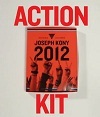
As 2012 comes to a close, we look back at some of the biggest online video virals of the year. This week, we look at the hugely successful (and rather controversial) ‘Kony 2012’ campaign, that raised a huge amount of awareness about the plight of children caught up in Uganda’s conflict. Invisible Children, a movement seeking to end the conflict in Uganda, created the film Kony 2012 back in March. They hoped it would accelerate the arrest of Lord’s Resistance Army (LRA) leader Joseph Kony, who has been kidnapping and abducting Uganda’s youth for nearly three decades. With more than 100 million views in six days, Kony 2012 became the most viral video in history. The video worked because it used compelling content, stayed relevant and had a simple call to action.
More on this Case study …
Brand: Invisible Children | Country: USA/ Global | Sector: Charity | Format: Video, YouTube
The movement, however, ended quite strangely. The video's creator, Jason Russell, was detained in the Pacific Beach neighborhood, with charges of public drunkenness and lewd behavior.
The producer used his adorable young son to tell a simple, but personal story about a complicated issue. At the end of the video, viewers were asked to simply spread the word; but Invisible Children took it a step further by distributing the video through social channels and asking others to do the same.
The call to action was simple and straightforward: make Joseph Kony famous by helping others to know his name. There was no complicated pledge form, no letter-to-the-editor to write, just a call to help spread the word. And when asked, people answered the call in droves.
The “Kony 2012” video helped bring the San Diego charity $26.5 million, according to its latest federal tax filing.
The revenue reported for the fiscal year that ended in June was twice what the nonprofit organization collected the year before.
“It definitely was a pretty outstanding year for Invisible Children,” CEO Ben Keesey said. “It was unexpected. We had big visions for the video and that campaign, but we had no idea that would happen.”
The 30-minute video was viewed more than 120 million times on the Internet and thousands of people donated to the cause. Some critics complained that material presented in the video was out of date.
Invisible Children co-founder Jason Russell, who checked into a treatment center after a mental breakdown in March that saw him ranting naked on a Pacific Beach sidewalk, received a salary hike from $90,000 to $119,000. Russell returned to work earlier this year.
The charity hired Chris Carver as chief operating officer at a $120,000 a year, more than the $92,800 paid to CEO Keesey.
Fundraising expenses more than tripled, from $287,000 for the year ending June 30, 2011 to just over $884,000 during the next 12 months, the tax filing shows.
Among other things, Invisible Children repairs schools, awards scholarships, makes loans to start small businesses, improves sanitation systems and runs an FM radio network that warns civilians about activities of Kony’s militia, the Lord’s Resistance Army, the filing says.